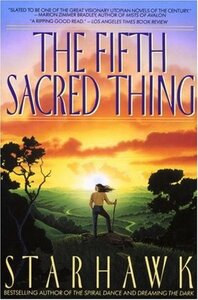You need to sign in or sign up before continuing.
Take a photo of a barcode or cover
I don't know if this book gave me hope or despair. Not sure if I care.
challenging
hopeful
inspiring
reflective
fast-paced
Plot or Character Driven:
A mix
Strong character development:
Yes
Loveable characters:
Yes
Diverse cast of characters:
Yes
Flaws of characters a main focus:
Yes
I thought this book explored many ideas of how society could, and possibly should, work. While I am unsure of how these ideas would work in a real context, it was a very powerful read that every time I come back to it has me learning something new about myself.
adventurous
challenging
dark
emotional
hopeful
inspiring
fast-paced
Plot or Character Driven:
A mix
Strong character development:
Yes
Loveable characters:
Yes
Diverse cast of characters:
Yes
Flaws of characters a main focus:
Yes
Anyone who is afraid of the coming future with climate change and late-stage capitalism closing in on us MUST read this book. It is inspiring. It is set in San Francisco in 2048 in a pseudo-utopia, a communist society in practice without the theory bros and instead led by love. Their city-society is founded on respect and caretaking of the four sacred things: water, earth, fire, and air. The world around them has been ravaged by climate change and war and they’ve been left alone by the christo-fascists in the last 20 years, but that is changing. If you want to see what love, solidarity, hardship and hope through revolution could look like here in the U.S. in the coming future, read this.
Problematic fave. In this book, there is a utopian anarchist society vs a dystopian fascist society. The utopian society is a bit silly and unrealistic. Like wow racism disappeared with no apparent effort in that direction? But it is also based on many values I hold dear and ultimately depicts a beautiful dream and a great story about the power of ideals and a vision of what could be.
Inspiring. A must-read for anyone who follows the reclaiming tradition of witchcraft. Unfortunately, it seems a bit out dated now because of changes in technology that we now know have occurred.
I don't know why I decided to pick this up and re-read it, but I'm so glad I did. I've been reading way to many dystopian novels lately, and although they all have hope in them, none touch me the way this book does. This book shows a painful future that is not unlike how we are living now, but it also shows a beautiful possibility of how things could be.
Every time I read this book, I am drawn in. So real, yet so not real.
All my college friends have read and lauded this book, so reading it myself felt a bit like visiting a place about which I'd heard lots and lots of stories. I think that if pagans were the type to write evangelical novels, they would read just like this book. At the outset, the world and characters seem so intriguing that you don't much care if there's a plot or not, as long as you get to learn a little more about them. Another interesting thing about this story is the way that Starhawk just plops you down into it, without giving the type of subtle explanation that other (more seasoned?) fiction writers include within the first few chapters. You have to read halfway through the book before even understanding exactly how Starhawk's utopic society works. I swayed between longing to live in this community (no poverty, no prejudice, lots of sex, and bisexuality as the norm) and feeling irritated that I had to spend 500 pages in some pagan woman's fantasy. Overall, this was one of those novels that cared more about the agenda than the story -- and that agenda was certainly not subtle. The heavy-handedness chafed me a bit, even if I do mostly agree with Starhawk's premise. I imagine that anyone who didn't agree with her premise wouldn't have the patience to get through the book, so it's destined to preach to the choir and no one else.






